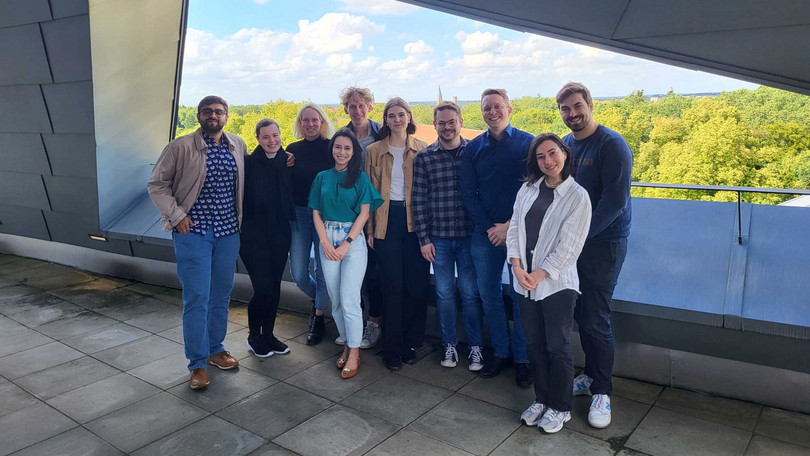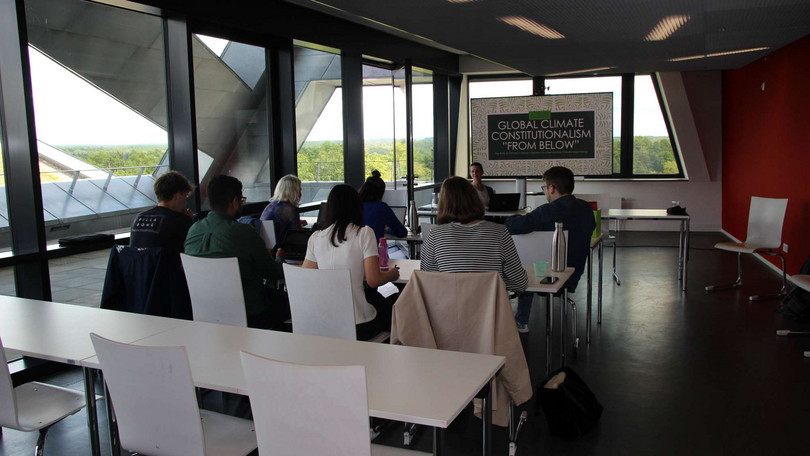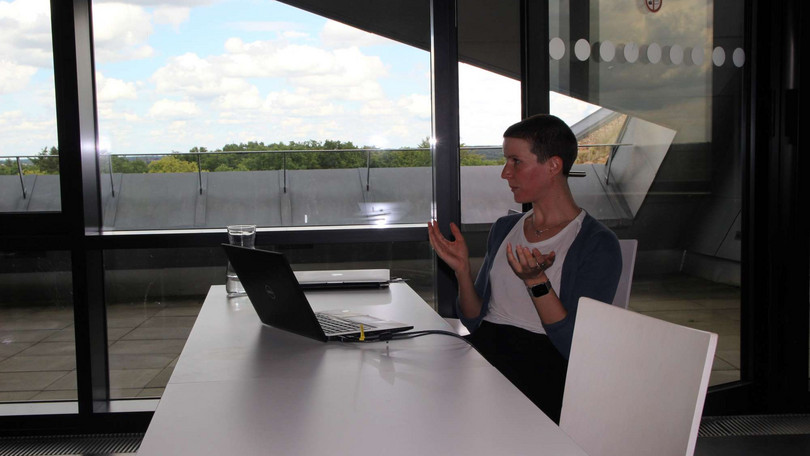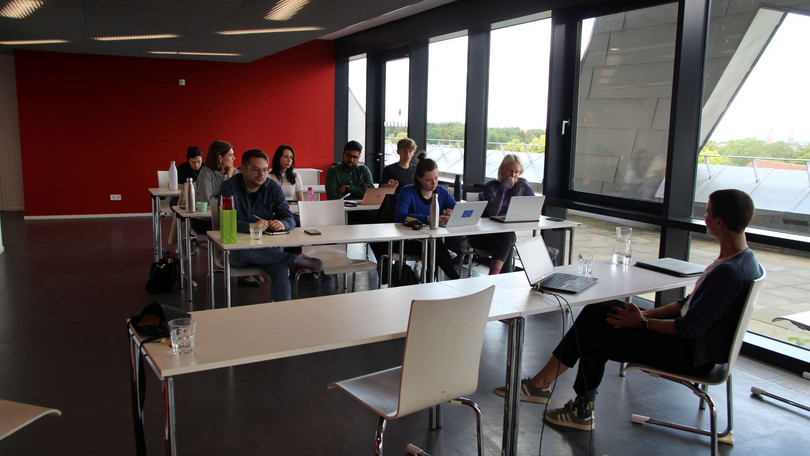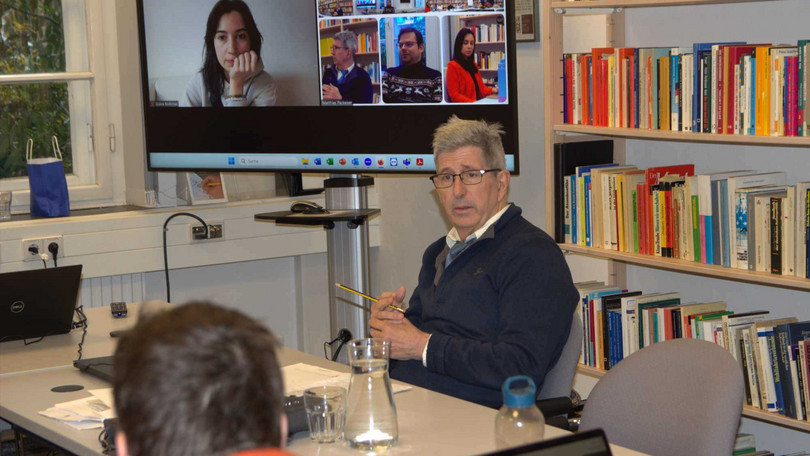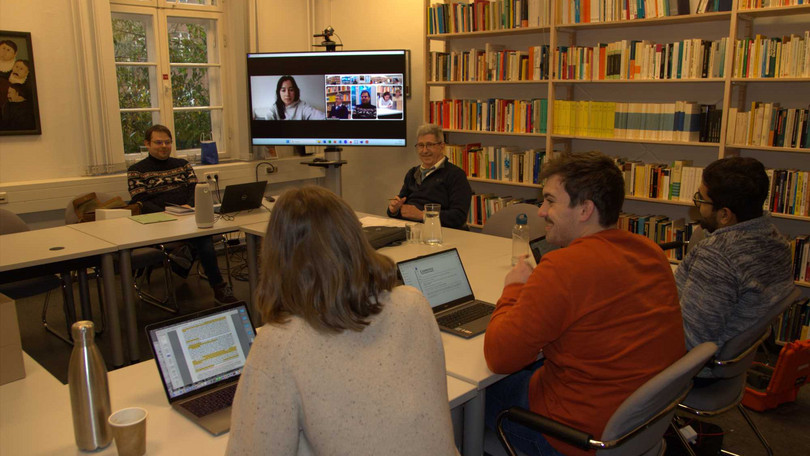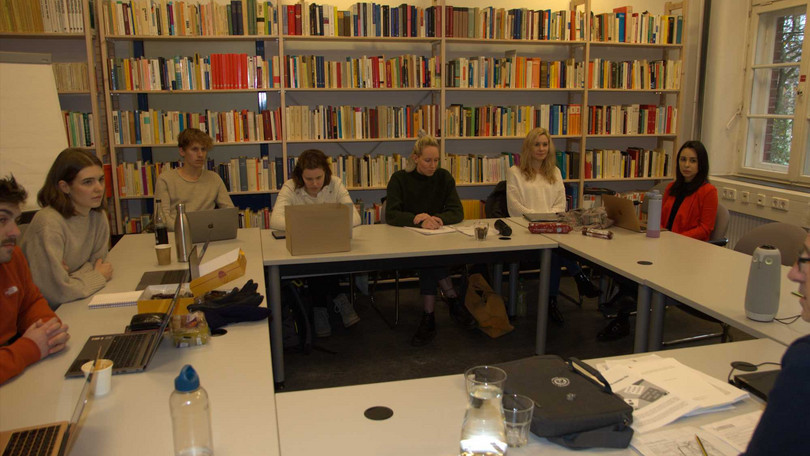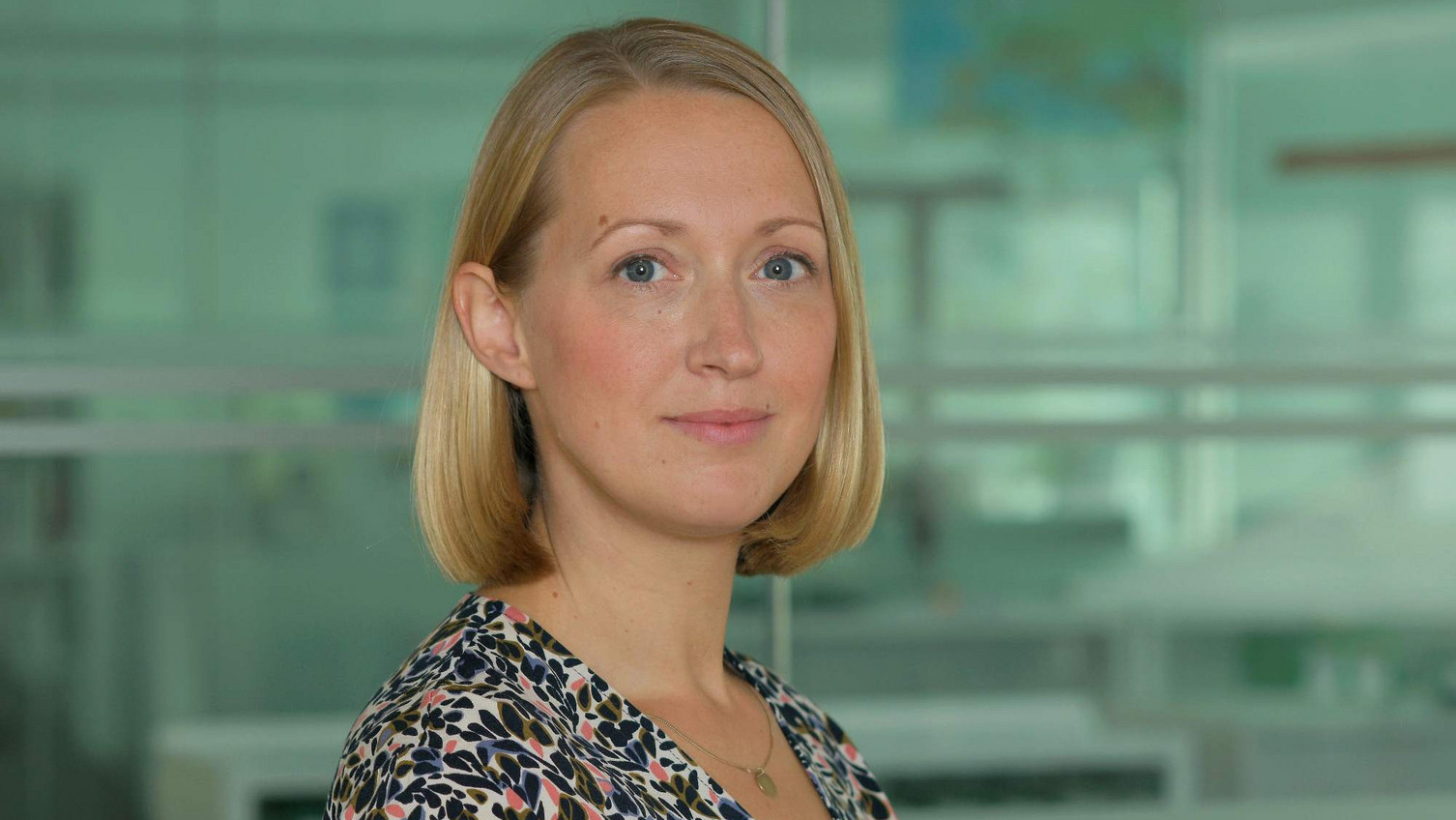Opening Event for the New Academic Year: Insights into Current International Environmental Law Research
on 15 October 2024 from 3:00 to 5:00 p.m. in room C40.704 (Central Building)
Speakers:
- Professor Dr. Louis Kotzé (North-West University (South Africa), recently Program Chair at THE NEW INSTITUTE) and
- Professor Dr. Kirsten Schmalenbach (Paris Lodron Universität Salzburg, currently Fellow at the Hamburg Institute for Advanced Studies)
On this occasion, they will present their current research projects on international environmental law, global commons, and natural rights.
Seminar: Scientific Publishing and Communication in Law
- Lecturer: Professor Dr. Louis Kotzé
Dates:
- 15 October 2024 (10:00 a.m. - 1:00 p.m.)
- 16 October 2024 (10:00 a.m. - 1:00 p.m.)
- 28 October 2024 (4:00 p.m. - 7:00 p.m.)
- 29 October 2024 (10:00 a.m. - 1:00 p.m.)
- 27 November 2024 (10:00 a.m. - 1:00 p.m.)
- 28 November 2024 (10:00 a.m. - 1:00 p.m.)
Link to the course on myStudy.
WORKSHOP: SCIENCE COMMUNICATION
- Lecturers: Marie-Luise Braun and Dr Wiebke Vorrath ( Department of Research Communication, Leuphana University Lüneburg)
This seminar on "Science Communication" adds an essential component to the lecture programme of the doctoral school with regard to the handling and dissemination of scientific findings. The topic of "science communication" covers a wide range of possibilities for publicising research results and placing them outside the boundaries of the scientific world. Effective and successful communication of these findings is of great importance, as science must not understood itself as a self-contained system. Instead, it is its task to always seek an exchange and dialogue with politics, business, and civil society regarding the knowledge gained.
Suitable approaches and possibilities for this purpose will be presented at this event.
DATES:
- 06 February 2025, 11:00 am to 2:00 pm
- 07 February 2025, 10:00 am to 1:00 pm
LOCATION:
- Room m of the Museum Lüneburg (link)
Guest Lecture: Climate Change Litigation (only in German)
16 October 2024, 3:00 - 5:00 p.m. in room C40.255
- Lecturer: Professor Dr. Remo Klinger (Link)
Prof Dr Remo Klinger is a lawyer and partner in the Berlin law firm Geulen & Klinger (link) and honorary professor at the Eberswalde University for Sustainable Development. He was involved in the groundbreaking 'climate decision' of the German Federal Constitutional Court (see here) as a representative of the plaintiffs, as well as in many other (groundbreaking) climate-related proceedings in recent years (e.g. against BMW (here), TUI and Shell).
In June this year, BUND (link) and Deutsche Umwelthilfe (link) again filed a constitutional complaint against the Federal Republic of Germany - in response to the recently passed amendment to the Climate Protection Act (see here). Once again, Professor Klinger is representing the plaintiffs in this case, with the aim of achieving more effective environmental protection by legal means (or fending off attempts to weaken obligations in this area).
In his guest lecture on 16 October 2024 (from 3:00 to 5:00 p.m. in room C40.255) at the Leuphana University Lüneburg, he will report on his experiences with the means of climate change litigation and the potential for shaping society through lawsuits.
Workshop "Law and Digitalisation"
- Lecturer: Professor Dr. Matthias Kettemann, LL.M. (Harvard) - Professor of Innovation, Theory and Philosophy of Law at Innsbruck University (link)
In this summer term, Prof. Dr. Matthias Kettemann provided the fellows of the Joachim Herz Doctoral School of Law with in-depth insights into the law of digitalisation.
The influence of digitalisation - even beyond the limits of the digital world - can hardly be underestimated today. Be it questions of justice or the influencing of elections, the impact of fake news (or even deep-fake videos), the handling of cyber attacks (and the question of their legal categorisation), or the handling of artificial intelligence - these are all issues that present our society with very real challenges and which it already has to deal with today.
Prof. Dr. Kettemann also drew a line to future developments and held out the prospect of what our society - and legal science in particular - will have to prepare for in the future. He thus gave the fellows a unique insight into the function of law as a shaper of (social) transformation.
As part of the first doctoral colloquium of this doctoral programme, the fellows presented their research work and the progress made to date.
The insights gained in this way then served as the basis for in-depth discussions. Due to the dedicated participation of the doctoral students, the supervising professors, and the speakers of the doctoral programme, the participants were able to gain important insights into the further processing and progress of their works.
Seminar "The International Law of the Sea and Small Islands"
- Lecturer: Professor Dr. Valentin Schatz - Junior professorship of Public Law and European Law with Focus on Sustainability at Leuphana University Lüneburg (link)
On 8 April 2024, Professor Dr. Schatz gave an introduction to international law of the sea and then went on to discuss the special situation of small island states.
These states are particularly threatened by climate change and - as a result of rising sea levels - are confronted with the scenario of their own demise. Due to this threat, they requested an advisory opinion (link) from the International Tribunal for the Law of the Sea (ITLOS) on 12 December 2022 to clarify the following question
What are the specific obligations of State Parties to the United Nations Convention on the Law of the Sea (the "UNCLOS"), including under Part XJI: (a) to prevent, reduce and control pollution of the marine environment in relation to the deleterious effects that result or are likely to result from climate change, including through ocean warm ing and sea level rise, and ocean acidification, which are caused by anthropogenic greenhouse gas emissions into the atmosphere? (b) to protect and preserve the marine environment in relation to climate change impacts, including ocean warming and sea level rise, and ocean acidification?
Professor Schatz's presentation was accompanied by an excursus on the protection of UNESCO cultural heritage sites by Emma Bartmann (link) - as well as a visit to the International Tribunal for the Law of the Sea on 12 June 2024.
Guest Lecture “Law and Governance of the Twin Transition”
- Lecturer: Professor Dr. Max Baumgart - Assistant Professor in European and national regulation of the energy transition at Tilburg University (link)
On 4 July 2024, Prof. Dr. Max Baumgart gave a guest lecture on the topic of "Law and Governance of the Twin Transformation" at Joachim Herz Doctoral School of Law.
The term Twin Transformation encompasses a holistic approach to the joint regulation of both the green transition and the digital transition. This concept aims to utilise sustainable digital technologies for the purpose of achieving carbon neutrality. On this occasion, Prof Dr Baumgart impressively demonstrated how this can be achieved with the help of law and various regulatory approaches.
Further publications by Prof. Dr. Max Baumgart:
Co-authored with Saskia Lavrijssen, Exploring regulatory strategies for accelerating the development of sustainable hydrogen markets in the European Union (Journal of Energy & Natural Resources Law, Volume 42, 2024)
Book Presentation: Global Climate Constitutionalism 'from Below'
- Dr. Manuela Niehaus (German University of Administrative Sciences Speyer, link)
On 17 June 2024, Dr Manuela Niehaus presented her recently published work "Global Climate Constitutional 'from below'" at the Joachim Herz Doctoral School of Law. The publication is based on her dissertation, which she completed as part of a joint PhD programme at the University of Hamburg and Macquarie University (Sydney, Australia).
At this occasion, Manuela provided the doctoral fellows with detailed insights into a highly complex subject. As part of her dissertation project, she analysed the role of non-state actors and NGOs that contribute to the further development of the law (at national and international level) through climate litigation and thus tackle the problem of the global climate crisis by legal means. In particular, the question arose as to whether the (re)interpretation of existing law by these same actors and the judgements issued in this way create new constitutional principles (in the sense of the concept of global constitutionalism).
We would like to thank Manuela for the exciting insights and the subsequent discussions.
Further information:
- Global Climate Constitutionalism “from below” - The Role of Climate Change Litigation for International Climate Lawmaking (Springer, 2023).
- Protecting Whose Children? The Rights of Future Generations in the Courts of Germany and Colombia (Völkerrechtsblog, 23.03.2022).
- Gerichte gegen Gesetzgeber? – Der Klimawandel in den Gerichtssälen, in: Zugang zum Recht (Jan. 2021), S. 241 - 260.
Guest Lecture "The Chilean Constitutional Reform Process"
- Lecturer: Svenja Bonnecke (link)
On 5 April, Svenja Bonnecke gave a guest lecture on the Chilean constitutional reform process at the Joachim Herz Doctoral School of Law. After a brief introduction, she went into detail about the two rejected constitutional drafts and gave an outlook on Chile's (legal) future.
The constitutional reform process is of the utmost importance with regard to the overarching theme of the Joachim Herz doctoral programme ("Law and Transformation") - after all, it is about reforming the common rules, values and procedures on which society is based. But the constitution as a social contract must also move with the times, be able to adapt and change in order to remain up-to-date.
Svenja Bonnecke's academic background - she studied law in both Germany and Chile - enabled her to present these connections in an excellent and unique way. We would like to thank her for these insights.
Further publications by Svenja Bonnecke on this topic (in German):
- Scheitern 2.0: Das Ende des zweiten Verfassungsprozesses in Chile (published on 12 January 2024 at www.juwiss.de)
- Verfassungsmüdigkeit: Chiles neuer Verfassungsprozess (published on 02 March 2023 at www.verfassungsblog.de)
- Schlechte Umfragewerte für Chiles Verfassung: Die Kommunikationsschwierigkeiten der Verfassungsgebenden Versammlung (published on 25 May 2022 at www.verfassungsblog.de)
Lecture "Research Methods in Legal Science"
- Lecturer: Dr. Matthias Packeiser
The course provides fundamental knowledge of scientific work at doctoral level in the field of law. This includes, inter alia, addressing questions about the nature of legal research, working with different research methods, structuring comprehensive research papers in terms of content and argumentation and, in particular, the topic of "Law in Context".
Seminar "Law and Transformation"
- Lecturer: Professor Christopher R. Rossi, Ph.D. (The Artic University of Norway, Tromsø)
The Joachim Herz Doctoral School of Law had the pleasure of welcoming Professor Christopher R. Rossi, Ph.D., to Lüneburg from 27 to 29 November. At this occasion, he gave a seminar on fundamental aspects of transformative developments under international law.
On the first day, Professor Rossi laid the theoretical groundwork for the seminar with insights from his recent research on the role of zones and areas in the current state system and the impact of uti possideitis on its very foundation. On the following two days, he then addressed topics such as global water scarcity, the role of rivers in international relations, the global struggle for resources, and the importance of the artic for both global climate and international trade.
For further readings, take a look at his recent publications:
- Remoteness Reconsidered: The Atacama Desert and International Law (2021 University of Michigan Press)
- Arctic anadromy and congested regime governance (52 Environmental Law Reporter 10193-10210, 2022)
- Water Security and Hydro-Egoism: Endogenous Hegemony and the Grand Ethiopian Renaissance Dam (32(2) Indiana International and Comparative Law Review, 247-286, 2022)
- Line of Amity, Line of Enmity, Large Policy Men and the American Grossraum (2023)
Seminar "The Good Scientist - A Seminar on Research Integrity"
- Lecturers: Dr. Claire Grauer, Dr. Anna Sundermann
The seminar concerns raising awareness and preparing doctoral students for ethically correct and responsible research activities before starting research projects. The goal is to integrate ethical considerations already in the planning phase of the doctoral journey.
The following key questions will guide the course:
- What is research ethics? What is good scientific practice?
- What does responsible research mean for my research field?
- What are the concrete implications of research integrity guidelines for my dissertation project?
- How can I contribute to a research community with integrity as a researcher?
Colloquium: The Belgian Klimaatzaak Judgement
On 8 January 2024, the Joachim Herz Doctoral School welcomed two guest speakers to a digital colloquium who took this opportunity to present their findings on the noteworthy Klimaatzaak ruling of the Brussels Court of Appeal of 30 November 2023 (cf.: link):
- Alice Briegleb, PhD student at the Université Libre de Bruxelles. She conducts research on the liability of companies in the fight against climate change (under the supervision of Prof. Dr Benoit Frydman).
- Antoine De Spiegeleir, PhD student at the European University Institute. In his doctoral thesis, he deals with the topic "Narrating International Law at the World Court" (under the supervision of Prof. Dr Neha Jain).
Their review of this judgement was published on the Verfassungsblog on 5 December 2023 under the title "From Urgenda to Klimaatzaak: A New Chapter in Climate Litigation" (cf.: here). The lawsuit was filed by the NGO Klimaatzaak (which was supported by around 58,000 citizens) against the current Belgian climate protection measures. In the second instance, the Brussels Court of Appeal has now ordered the Belgian federal state and the regions of Flanders and Brussels to reduce their greenhouse gas emissions by 55% by 2030 compared to 1990 levels.
After an introduction to the ruling, the fellows of the Joachim Herz Doctoral School discussed with the speakers current issues of international environmental law, the tendency of national courts to pass judgement on the climate protection measures of their respective governments, as well as legal theoretical and political issues raised in this context (e.g. regarding the separation of powers or the judicial dialogue between domestic courts of different nations).
We would like to thank Alice and Antoine for their fascinating presentation and the insightful discussion.
Guest Lecture "From War to Peace: Challenges in Post-Conflict Transformation"
- Lecturer: Dr. Julia Strasheim (link)
On 18 January 2024, Dr Julia Strasheim gave the members of the Joachim Herz Doctoral School of Law exciting insights into the topic "From War to Peace: Challenges in Post-Conflict Transformation".
Dr Strasheim is deputy managing director of the Bundeskanzler-Helmut-Schmidt-Stiftung (link), where she is responsible for the "Europe and International Politics" programme line. As a political scientist and conflict researcher, she has extensive expertise with regard to questions concerning the challenges that societies have to deal with after - but also during - conflicts and especially wars.
Her guest lecture (on the premises of the Joachim Herz Foundation) inspired the fellows of our doctoral school. Dr Strasheim provided well-founded insights into the subject matter, which she was able to gather through her research, her practical experience in conflict resolution, and, in particular, through her work for the BKHS. In a subsequent discussion round, it was then up to the Fellows to ask questions, contribute new perspectives, and share their own experiences.
We would like to thank Dr Strasheim very much for her exceptional presentation.

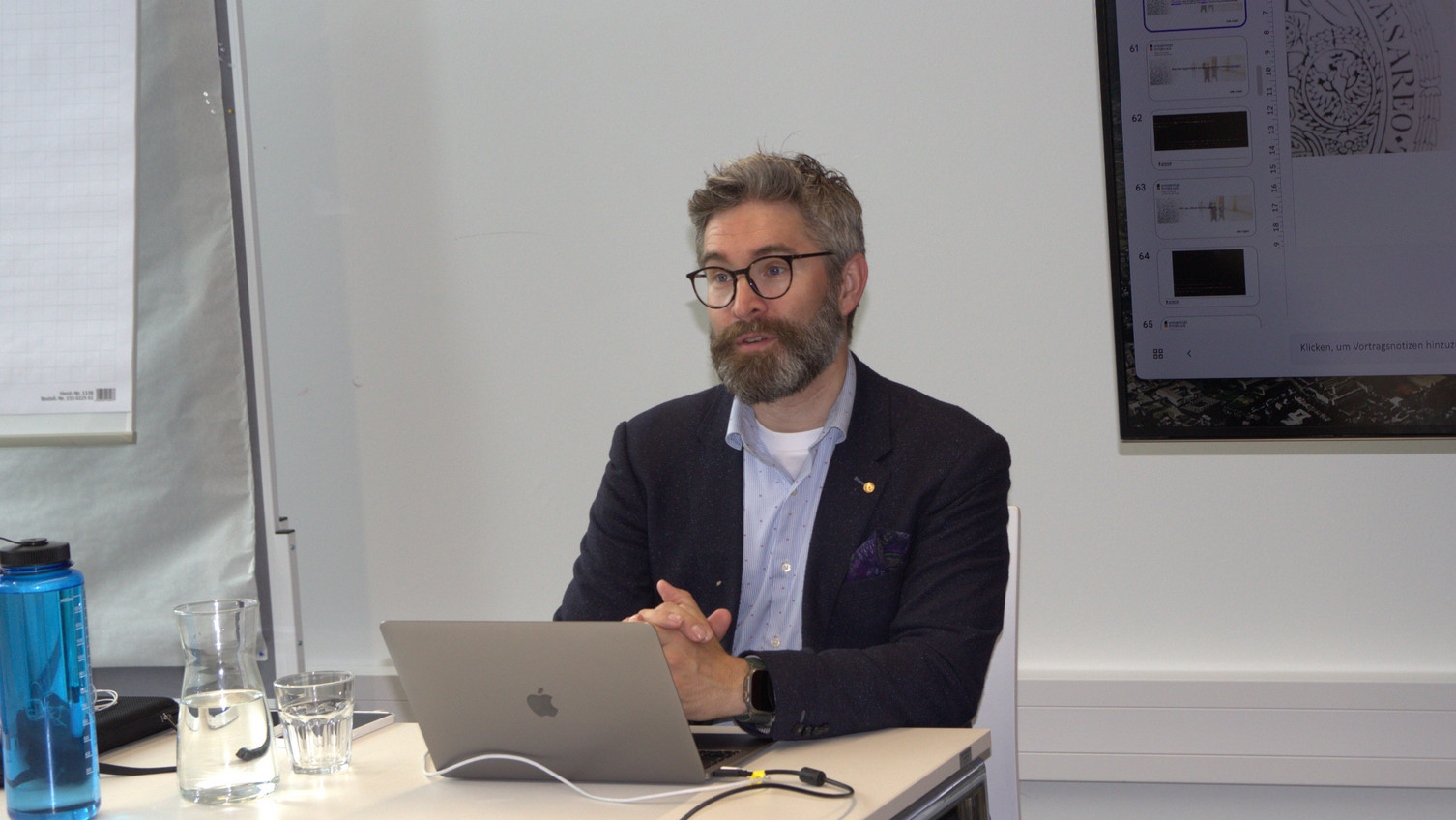
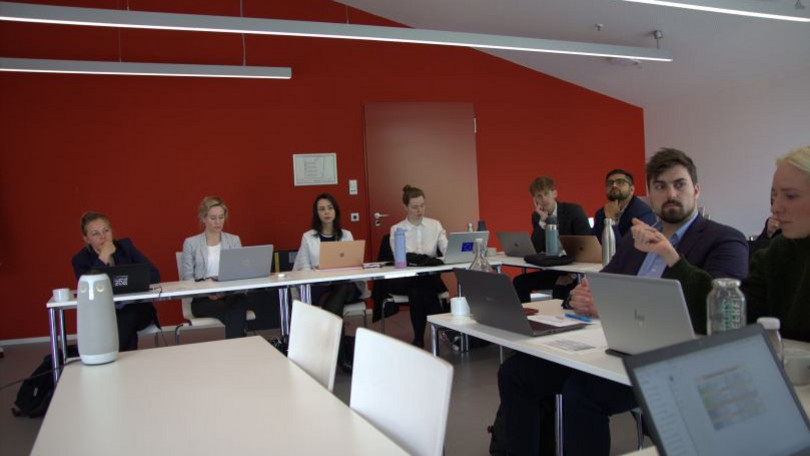
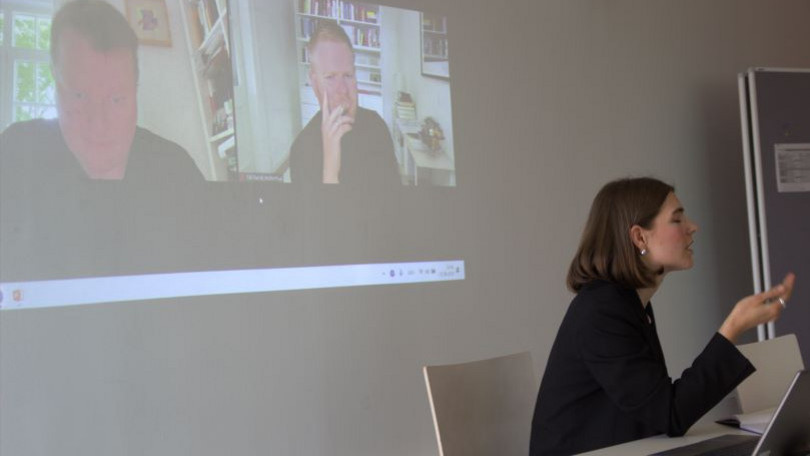
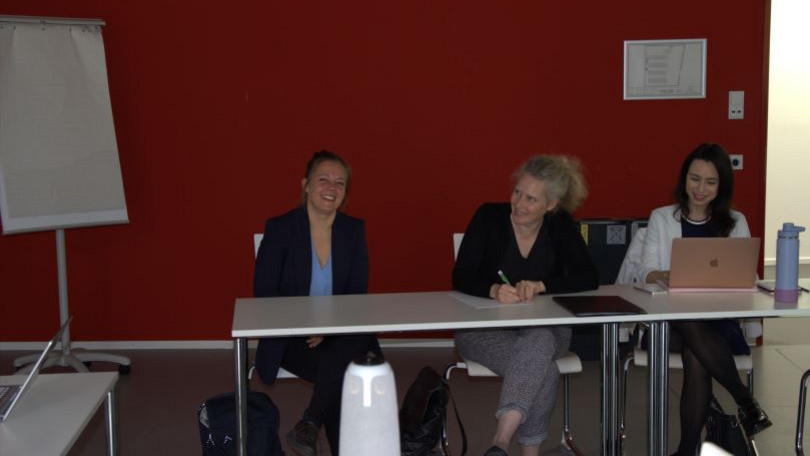
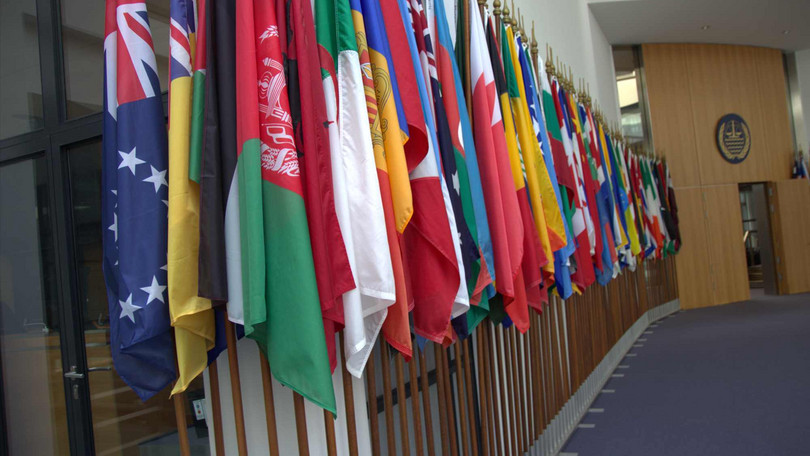
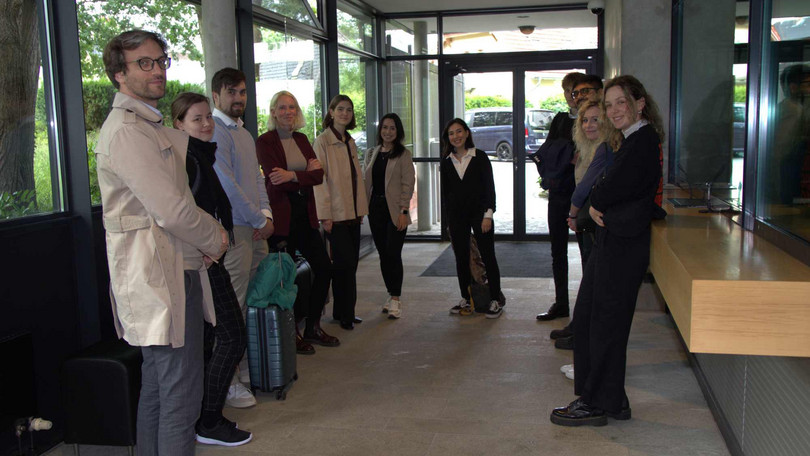
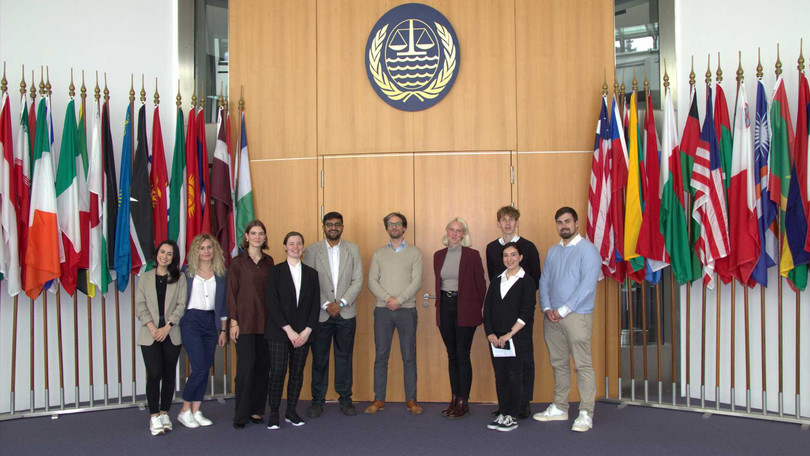
![[Translate to Englisch:] Prof. Dr. Max Baumgart](/fileadmin/_processed_/9/8/csm_Prof._Baumgart_b02d7e6785.jpg)
![[Translate to Englisch:] Prof. Dr. Max Baumgart mit den Fellows](/fileadmin/_processed_/8/5/csm_Gruppe_Prof._Baumgart_1_135c80a607.jpg)
